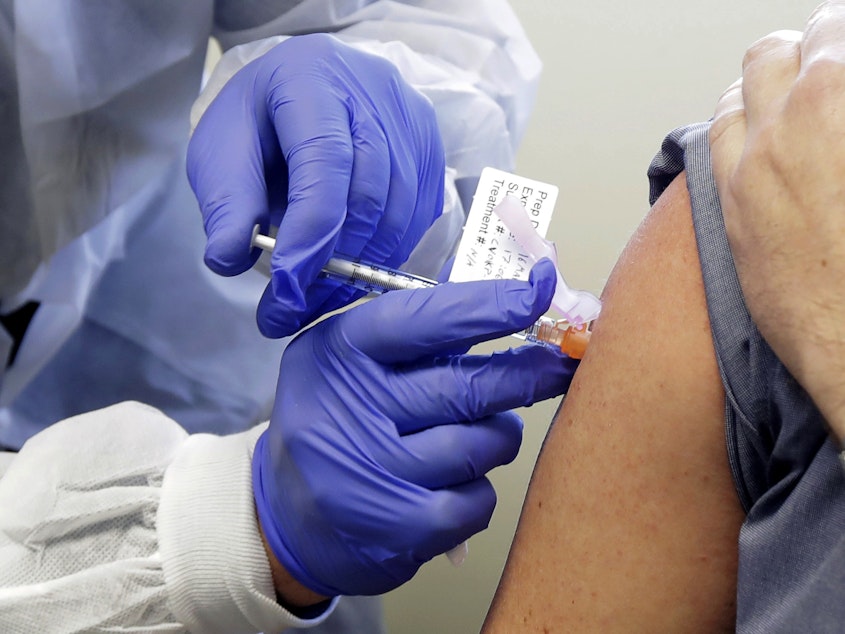Questions About How Crash Program Is Picking Coronavirus Vaccines To Back

More than 100 coronavirus vaccines are being studied around the world, but less than a dozen have begun testing in humans.
The federal government's goal is to have a COVID-19 vaccine ready by January 2021. To achieve that objective, the White House formed Operation Warp Speed, a public-private partnership, to push the development, testing and manufacture of a vaccine at a breakneck pace.
NPR has learned that Operation Warp Speed has narrowed its current list down to seven, according to people familiar with the matter but who weren't authorized to speak about it publicly.
So far, five coronavirus vaccine makers have received lucrative government contracts. Most are pillars of the pharmaceutical industry: AstraZeneca, Johnson & Johnson, Merck and Sanofi. Only Moderna, a relative upstart that is working with the National Institute of Allergy and Infectious Diseases, isn't a well-known name.
Some of the funding for the vaccine work is coming from the Biomedical Advanced Research and Development Authority, part of the Department of Health and Human Services.
The Operation Warp Speed team is led by Moncef Slaoui, former chairman for vaccines at GlaxoSmithKline. The group includes officials from the Food and Drug Administration, the Department of Defense and other parts of the government. The team came up with an initial list of 14 vaccine candidates and said it planned to slim it down to eight. Eventually, there are expected to be three to five finalists.
But how government officials are picking vaccine candidates to back has been kept largely under wraps. That secrecy could undermine confidence in the eventual vaccines, former federal health officials say.
"We're operating in such an atmosphere of distrust in this country," says Dr. Nicole Lurie, assistant secretary for preparedness and response during much of the Obama administration. "But the more explanation there is and the more transparency, the better off we are."
Dr. Peter Lurie, of no relation, agrees. Now president of the Center for Science in the Public Interest, Lurie previously served previously as associate commissioner of public health strategy and analysis at the Food and Drug Administration.
"Let's remember that this is a product line that is mired in all kinds of controversy created by people who question the science of vaccines," he says. "And so in this case in particular, it's important to have full public trust in the process."
The relationship between Operation Warp Speed's efforts and HHS's preexisting contracting work isn't clear. The operation wasn't announced until May, but many of the contracts had gone out earlier this year.
While money that's part of HHS's BARDA, can go toward Operation Warp Speed, it has other government pocketbooks it can access.
According to federal records, the first major COVID-19 vaccine award went to Johnson and Johnson about three months ago. HHS awarded two more vaccine contracts to Sanofi and Moderna in April. The largest one to date, at $1.2 billion, went to AstraZeneca in May. HHS also awarded a contract to Merck and the nonprofit IAVI.
Three of the five companies that got funding have not yet started clinical trials for their vaccine candidates. According to the World Health Organization, only 10 coronavirus vaccines are currently in human trials.
Two candidates, being developed by Moderna and AstraZeneca, are being tested in early phase clinical trials sponsored by the National Institutes of Allergy and Infectious Diseases and the University of Oxford, respectively. NIAID tells NPR its study of the Moderna vaccine has cost taxpayers $4.2 million to date.
Moderna said Thursday that in July it expects to begin phase 3 testing of the vaccine compared with a placebo in 30,000 people. Data from that study would show whether that vaccine is safe and effective for the prevention of COVID-19.
Manufacturers need to start ramping up production capacity as soon as possible if they're going to make a big enough supply to vaccinate the population, Nicole Lurie says. To meet global demand, several vaccines will likely be needed.
That means companies need to make vaccines before we know if they really work, which is both expensive and risky. That's why the government and other organizations are stepping in to help with funds.
Former officials say they expect the larger pool of possible vaccines to shrink as data indicate some are better than others. But Nicole Lurie, wonders whether there's enough scientific data for Operation Warp Speed to narrow down the list so soon. Future studies might show problems with the chosen vaccines, so it would be prudent to have alternatives.
"It seems to me from what I know at this point, that's still a pretty risky proposition," she says.
Companies left off Operation Warp Speed's short list may drop their COVID-19 vaccine projects.
"Now, that's probably not the U.S. government's concern, but it's not clear to me how these decisions were made," Nicole Lurie says. "And it's not clear to me whether they were made on scientific grounds or economic grounds."
In response to a question about disclosure, an HHS spokesperson pointed to the administration's announcement about Operation Warp Speed that said there will be "public updates" tied to "certain scientific milestones," such as clinical trial results.
There may be more details soon. A senior administration official tells NPR that Operation Warp Speed is working on a process to keep Congress and the public informed about its progress. [Copyright 2020 NPR]



